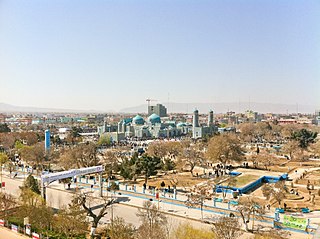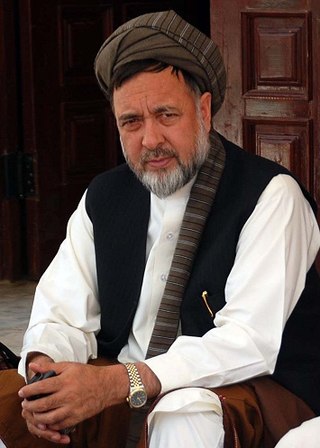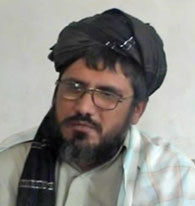
Mazār-i-Sharīf, also called Mazār-e Sharīf, or just Mazār, is the fourth-largest city of Afghanistan, with a population estimate of 1,000,000 people. It is the capital of Balkh province and is linked by highways with Kunduz in the east, Kabul in the southeast, Herat in the southwest and Termez, Uzbekistan in the north. It is about 55 km (34 mi) from the Uzbek border. The city is also a tourist attraction because of its famous shrines as well as the Islamic and Hellenistic archeological sites. The ancient city of Balkh is also nearby.

Sar-e Pol, also spelled Sari Pul, is one of the thirty-four provinces of Afghanistan, located in the north of the country. It borders Ghor and Bamyan to the south, Samangan to the east, Balkh and Jowzjan to the north, and Faryab to the west. The province is divided into 7 districts and contains 896 villages. It has a population of about 632,000, which is multi-ethnic and mostly a tribal society. The province was created in 1988, with the support of northern Afghan politician Sayed Nasim Mihanparast. The city of Sar-e Pol serves as the provincial capital.

Atta Muhammad Nur is an Afghan exiled politician and former militant who served as the Governor of Balkh Province in Afghanistan from 2004 to January 25, 2018. An ethnic Tajik, he worked to educate the Mujahideen after the 1979 Soviet invasion of Afghanistan, gaining the nickname "The Teacher". He then became a mujahideen resistance commander for the Jamiat-e Islami against the Soviets.

Haji Muhammad Mohaqiq is a politician in Afghanistan, who served as a member of the Afghanistan Parliament. He is also the founder and chairman of the People's Islamic Unity Party of Afghanistan. During the 1980s, he served with the mujahideen rebel forces fighting against the Soviet-backed Afghan government. After the withdrawal of the Soviet Union in 1989, Mohaqiq was appointed as the leader of the Hezb-e Wahdat for northern Afghanistan.

The Northern Alliance, officially known as the United Islamic National Front for the Salvation of Afghanistan, was a military alliance of groups that operated between late 1996 to 2001 after the Islamic Emirate of Afghanistan (Taliban) took over Kabul. The United Front was originally assembled by key leaders of the Islamic State of Afghanistan, particularly president Burhanuddin Rabbani and former Defense Minister Ahmad Shah Massoud. Initially it included mostly Tajiks but by 2000, leaders of other ethnic groups had joined the Northern Alliance. This included Karim Khalili, Abdul Rashid Dostum, Abdullah Abdullah, Mohammad Mohaqiq, Abdul Qadir, Asif Mohseni, Amrullah Saleh and others.

Juma Khan Hamdard is an Afghan politician. He served as the security adviser to President Ashraf Ghani. He served as governor of Paktia Province from 2007 to 2015, previously serving as governor of Baghlan and later Jowzjan province. He is the head of the alliance of H.A.A Councils.

Mullah Mohammad Fazl is the former acting Deputy Defense Minister of the Islamic Emirate of Afghanistan, serving from 7 September 2021 to 21 September 2021. He also served in the position during the previous Taliban government (1996–2001).

Khairullah Said Wali Khairkhwa is the current Afghan Minister of Information and Culture and a former Minister of the Interior. After the fall of the Taliban government in 2001, he was held at the United States Guantanamo Bay detainment camp in Cuba for 12 years. He was released in late May 2014 in a prisoner exchange that involved Bowe Bergdahl and the Taliban five. Press reports have referred to him as "Mullah" and "Maulavi", two different honorifics for referring to senior Muslim clerics.

Abdul Haq Wasiq is the current Director of Intelligence of the Islamic Emirate of Afghanistan since September 7, 2021. He was previously the Deputy Minister of Intelligence in the former Taliban government (1996–2001). He was held in extrajudicial detention in the Guantanamo Bay detainment camps, in Cuba, from 2002 to 2014. His Guantanamo Internment Serial Number was 4. American intelligence analysts estimate that he was born in 1971 in Ghazni Province, Afghanistan.

Mullah Abdul Rauf Aliza, widely identified as Mullah Abdul Rauf Khadim, was a Taliban member held in extrajudicial detention in the United States Guantanamo Bay detention camp, in Cuba, until 20 December 2007. His Guantanamo Internment Serial Number was 108.

The 1996–2001 Afghan Civil War took place between the Taliban's conquest of Kabul and their establishing of the Islamic Emirate of Afghanistan on 27 September 1996, and the US and UK invasion of Afghanistan on 7 October 2001: a period that was part of the Afghan Civil War that had started in 1989, and also part of the war in Afghanistan that had started in 1978.
Mohammed Abdul Kabir is a senior member of the Taliban leadership and an acting third deputy prime minister, alongside Abdul Ghani Baradar and Abdul Salam Hanafi, of Afghanistan since 4 October 2021. He previously was the acting prime minister of Afghanistan from 16 April 2001 to 13 November 2001.

The fall of Mazar-i-Sharif in November 2001 resulted from the first major offensive of the Afghanistan War after American intervention. A push into the city of Mazar-i-Sharif in Balkh Province by the United Islamic Front for the Salvation of Afghanistan, combined with U.S. Army Special Forces aerial bombardment, resulted in the withdrawal of Taliban forces who had held the city since 1998. After the fall of outlying villages, and an intensive bombardment, the Taliban and al-Qaeda forces withdrew from the city. Several hundred pro-Taliban fighters were killed. Approximately 500 were captured, and approximately 1,000 reportedly defected. The capture of Mazar-i-Sharif was the first major defeat for the Taliban.
((Short description|Civil war in Afghanistan}}

Muhammad Rasul was the leader of the High Council of the Islamic Emirate of Afghanistan, a Taliban dissident group in Afghanistan, until the group's dissolution in 2021. He was a Taliban-appointed governor of Nimruz Province, Afghanistan. Rasul exerted pressure and suppression on Pashtun factions unpopular with the Taliban, and made a considerable fortune controlling cross-border drug-smuggling through Nimruz.

Mullah Noorullah Noori is the current Minister of Borders and Tribal Affairs of the Islamic Emirate of Afghanistan since 7 September 2021. He was also the Taliban's Governor of Balkh Province during their first administration (1996–2001). Noorullah Noori spent more than 12 years in extrajudicial detention in the United States's Guantanamo Bay detention camps, in Cuba. Noori was released from the detention camp on May 31, 2014, in a prisoner exchange that involved Bowe Bergdahl and the Taliban Five, and flown to Qatar.
The Taliban Five were five Afghan detainees at Guantanamo Bay and former high-ranking members of the Taliban government of Afghanistan who, after being held since 2002, indefinitely without charges, were exchanged in 2014 for United States Army sergeant Bowe Bergdahl.

High Council of the Islamic Emirate of Afghanistan (HCIEA) (Pashto: دٙ اَفغانِستان اِسلامي اِمارَت عالي شوریٰ, romanized: Də Afġānistān Islāmī Imārat 'Ālī Šūrā ; Persian: شُورٰایِ عٰالئِ اِمٰارَتِ اِسلٰامیِ اَفغٰانِستٰان, romanized: Šowrāye 'Ālīye Emārate Eslāmīye Afġānestan) was a breakaway Taliban faction active in Afghanistan since 2015. The faction broke away from the Taliban in 2015 following the appointment of Akhtar Mansour as the leader of the Taliban and elected Muhammad Rasul as its leader. The faction was involved in deadly clashes with mainstream Taliban in southern and western Afghanistan, leaving scores of dead on both sides. The Islamic Republic of Afghanistan allegedly provided financial and military support to the faction, however, both the Islamic Republic and the faction denied this. Following the Taliban offensive of 2021 and the fall of Afghanistan to Taliban forces, the group dissolved, and its leaders pledged allegiance to the new government.
Mullah Muhammad Daud Muzamil was a politician in the Islamic Emirate of Afghanistan who served as Governor of Balkh province. Prior to that, he served as Governor of Nangarhar province. He was a member of the Taliban.
























